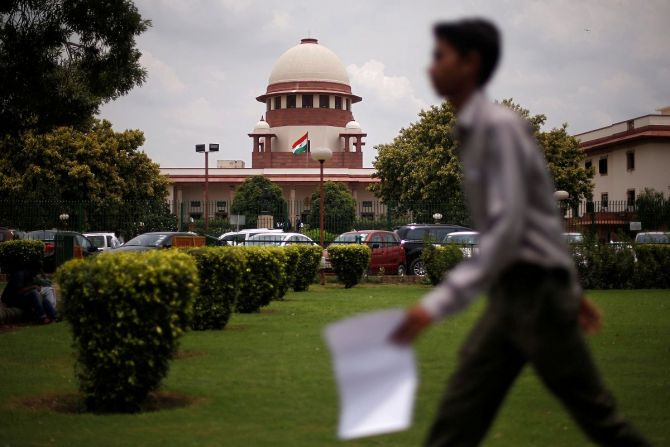The Tamil Nadu government has informed the Supreme Court that Governor R N Ravi withholding its assent to bills passed by the legislative assembly for the second time would lead to failure of democratic system in the country.

A bench of Justices J B Pardiwala and R Mahadevan was hearing two petitions filed by the Tamil Nadu government over its lingering confrontation with the governor on the issue of assent to bills passed by the assembly.
The top court said due to the dispute between the parties, people and the state were suffering.
Senior advocate Mukul Rohatgi, appearing for the state government on February 4, said under the law, if the state legislature passes the bill, the governor could ask for a reconsideration.
"However, if the same bill is re-enacted and presented before the Governor for the second time, the governor has no other option but to grant assent. This is the procedure laid down in our constitutional framework. If he still does not give his assent or failure to give his assent, then it is the failure of our democratic system," Rohatgi argued.
Constitutional provisions were very clear to the effect that the Governor was duty bound to give his assent in the second round, he added.
Senior advocate Abhishek Singhvi, also appearing for Tamil Nadu government, submitted the option to refer the bills to the President had to be done at the first instance and couldn't be done as an afterthought.
He submitted after the reenactment of the bill and on being presented to the Governor, he had no other option but to grant assent and couldn't reserve the bill in the second round for the President's consideration.
The hearing remained inconclusive and the bench posted the matter on February 6 saying it would first hear counsel for Tamil Nadu government and then Attorney General R Venkataramani representing the Governor.
The state government moved the top court in 2023 alleging delay by Ravi in granting assent to bills.
Tensions between Ravi and the M K Stalin government escalated when the state assembly re-adopted 10 bills returned by him.
On December 13, 2023, observing the business of governance must go on, the top court said it did not want to restrain the President of India from acting on the bills re-adopted by the Tamil Nadu assembly and forwarded to her by Governor Ravi for consideration.
It noted the submissions of the counsel for the state government and the attorney general that Chief Minister M K Stalin and Governor Ravi had agreed to meet, as asked by the apex court, and resolve the impasse over the bills not getting gubernatorial assent after its passage by the state legislature.
The key question was whether the Governor of a state could refer the bills passed by the legislature and re-adopted by it, for presidential assent, the state government contended.
The top court has said the governor of a state couldn't refer bills passed by the legislature and re-adopted by it for presidential assent, and asked the Tamil Nadu Governor to hold a meeting with the chief minister in an effort to end the impasse over 10 such pending bills.
The top court had questioned the delay on the part of Ravi in granting assent to several bills passed by the state assembly, asking why should governors wait for parties to move the top court with their grievances.
Questioning him, it observed the bills were pending since January 2020.
The top court said the Governor's office received 181 bills and he assented to 152 whereas five bills were withdrawn by the government. Nine bills were reserved for presidential assent and consent to 10 others was withheld, the court had noted.
The bills related to different departments including law, agriculture and higher education.











 © 2025
© 2025